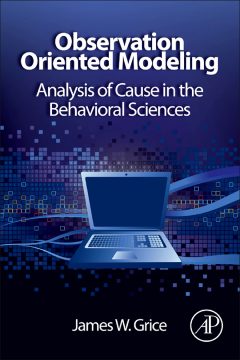
Additional Information
Book Details
Abstract
This book introduces a new data analysis technique that addresses long standing criticisms of the current standard statistics. Observation Oriented Modelling presents the mathematics and techniques underlying the new method, discussing causality, modelling, and logical hypothesis testing. Examples of how to approach and interpret data using OOM are presented throughout the book, including analysis of several classic studies in psychology. These analyses are conducted using comprehensive software for the Windows operating system.
- Describes the problems that statistics are meant to answer, why popularly used statistics often fail to fully answer the question, and how OOM overcomes these obstacles
- Chapters include examples of statistical analysis using OOM
"James Grice’s timely and important book is a methodological tour de force. It marshalls a number of telling criticisms of the traditional variable-centered approach to behavioral research and offers a methodologically coherent alternative in the form of Observation Oriented Modeling. Appropriately grounded in a realist philosophy, observation oriented modeling is a person-centered methodology that enables the researcher to effectively test causal hypotheses and theories by using purpose-constructed software. The book will be an instructive companion for graduate students and professional researchers alike. Behavioral researchers need to be apprised of the limitations of their orthodox methodology and provided with an alternative that promises to advance our psychological knowledge of people. Grice’s ground-breaking book does both in a highly accomplished fashion."--Professor Brian Haig, University of Canterbury
"A learned, detached examination of the well springs of modern psychology. As a university discipline, psychology came into its own in the early part of the twentieth century in the shadow of the positivism of the Vienna Circle. To the extent that psychology has been colored by the shallowness of positivism, it has been disadvantaged in both theory and in practice. A philosophy which effectively limits scientific inquiry to description and prediction has little explanatory power. Grice shows clearly the limitations of such a method and argues for a return to the common sense realism of Aristotle and its recognition of the explanatory value of the metaphysical concept of human nature and irs role in causal explanation. Rarely since the work of Mortimer Adler has there been such an indepth study of the philosophical bias of much contemporary research in psychology."--Jude P. Dougherty, Editor. Review of Metaphysics
